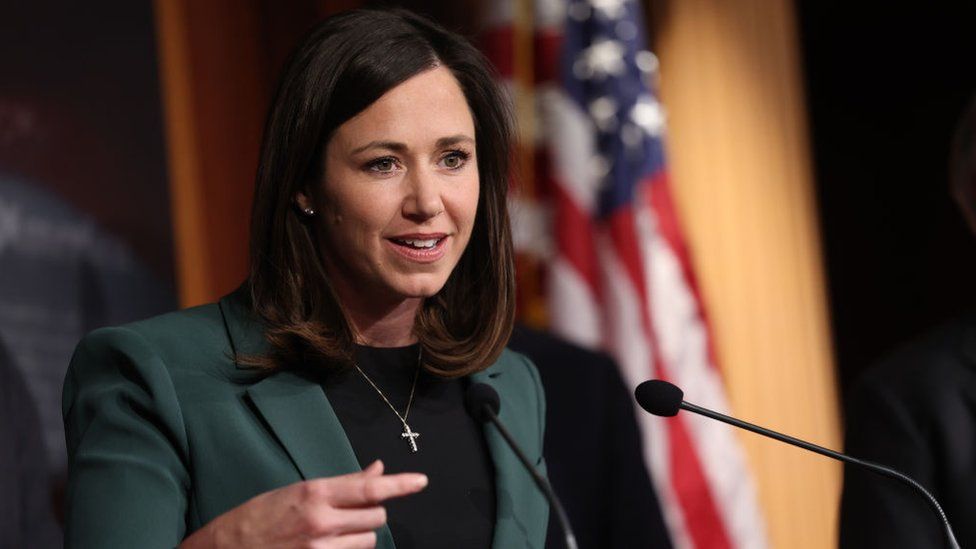ARTICLE AD BOX
 Image source, Getty Images
Image source, Getty Images
By Matt Murphy
BBC News, Washington
Alabama's Katie Britt, the youngest woman representing the Republicans in the US Senate, will offer her party's response to President Joe Biden's third State of the Union address on Thursday night.
The rebuttal - first delivered in 1966 - is often offered by young rising stars in the opposition party.
As a staunch conservative, but one who has broadly avoided crafting an overly close association with former President Donald Trump, Senator Britt fits the bill.
Vocally anti-abortion and highly critical of the Biden administration on the spiralling national debt, the 42-year-old has avoided isolationist tendencies in her party and has emerged as a hawkish figure on national security.
Some commentators have suggested that Sen Britt is the type of conservative that the party hopes could win back voters alienated by Mr Trump.
After earning a law degree at the University of Alabama, she served variously as press secretary, communications director and chief of staff to Alabama Senator Richard Shelby.
In 2018, she was elected as the first woman to lead her state's business council, where she became associated with the Keep Alabama Open campaign during the Covid-19 pandemic. The role elevated her profile within the state, and her resignation in 2021 prompted speculation - proven correct - about her intention to seek the Senate seat of her outgoing mentor, Sen Shelly.
She was elected in 2022 after easily seeing off her main opponent for the Republican nomination, Mo Brooks - a state representative at the time and a long-time adversary of Mr Trump's - before sweeping away her Democratic rival in the general election.
Since her arrival in Washington DC, Ms Britt has taken a position on the powerful Senate appropriations committee and worked as a key fundraiser for more senior colleagues.
Among Democrats, she has won some approval by working on a bipartisan bill prohibiting children under 13 from using social media and visiting John Fetterman when the Pennsylvania senator checked into hospital to seek treatment for depression.
Thursday's speech will give her the chance to elevate her profile among senate colleagues to the national stage.
Some, including former Republican House Speaker Newt Gingrich, have framed the rebuttal opportunity as an audition for a spot on Mr Trump's list of candidates for the vice-presidency.
But Sen Britt and the former president are not natural allies, despite his endorsement of her senate campaign in 2022.
She was the last member of Alabama's congressional delegation to endorse the 77-year-old in December, and observers note that her political views have been more temperate than Mr Trump's.
Image source, Getty Images
Image caption,Unlike some fellow Repulican senators, like JD Vance (L), Ms Britt has avoided a close association with Donald Trump
In an interview with Politico last year, Sen Britt criticised - obliquely - Mr Trump's penchant for personalised attacks on his political opponents.
"I really believe we have to get back to a place in this nation where you don't have to agree with someone 100% to show them respect and to be able to have a conversation and dialogue that you can learn from," she said.
Indeed, the Alabama native has been more closely aligned with outgoing Republican Senate Leader Mitch McConnell, joining his leadership group as an informal adviser last year. Mr McConnell - a veteran dealmaker in the chamber - has long been at odds with Mr Trump and his brand of politics.
Sen Britt has also become known for her hawkish views on national security, at times running up against colleagues in a party increasingly defined by American isolationism.
House Republicans - and some allies in the Senate - have railed against increased aid for Ukraine as Russia forces have managed to retake key areas in the eastern Donbas region and put a halt to a much anticipated counterattack.
"An emboldened Russia is an emboldened China is an emboldened Iran," Sen Britt told Politico earlier this year. "And make no mistake, none of those are our friends."
Sen McConnell welcomed her stance, saying he believed in echoed his own, in yet another indication that the Alabama senator could be groomed for leadership.
But she faced criticism after voting against a Senate bill which would have granted Ukraine billions more in military aid.
She argued the bill did not do enough to secure the US southern border - a key demand Republicans have tied to more aid.
Nonetheless, she has remained in favour with senior members of the Senate leadership and those within Mr Trump's orbit, a difficult feat.

 1 year ago
89
1 year ago
89








 English (US) ·
English (US) ·